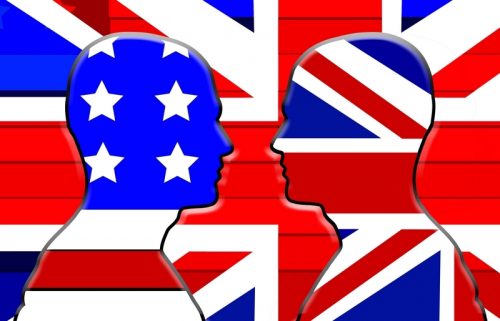A brief summary of popular American and British slang words, their meanings, and explanations of their origins.
With 1.5 billion English speakers globally, it’s not surprising that there are 160 distinct regional variations of the language, each employing slightly different spellings, pronunciations, and slang. The disparities between UK English and US English are particularly noteworthy. When utilizing study materials from both linguistic traditions, it’s beneficial to identify words unique to each country. This brief overview highlights common terms with divergent meanings on either side of the Atlantic, accompanied by explanations for some prevalent phrases.
What is your English level?
Find out your A1 A2 B1 B2 C1 C2 level of English with our quick, free online test.
British slang phrases
1. Bits and bobs
Meaning: Different assorted items.
You should finally sort out all bits and bobs on our basement shelves.
“Bits and bobs” can be alternatively referred to as “knick-knacks,” “odds and ends,” or “junk.” This terminology originates from an older practice of describing small change. In the early 20th century, “bit” was slang for a coin, and “bob” was slang for a shilling. The phrase “bits and bobs” is commonly used by British individuals, making it a valuable expression to be familiar with.
2. Taking the Mickey
Meaning: To mock or ridicule someone, subjecting them to repeated teasing.
I don’t want to meet your British friend because he’s constantly taking the Mickey!
To begin with, this expression isn’t related to Mickey Mouse, although using that association might aid in remembering it!
“Taking the Mickey” originates from Cockney rhyming slang, a form of East London English. In this linguistic style, words, often of a vulgar nature, are substituted with others that rhyme with them.
Originally, the phrase was more extended: “to take the Mickey Bliss.” The identity of “Mickey Bliss” remains uncertain, and it’s possible that he never existed. What matters is that the name rhymes with a British vulgar term referring to urine, “p*ss.” The expression “taking the p*ss” is also synonymous with teasing someone.
Are you C1 Advanced English?
Get your C1 Advanced English certificate now!
✓ Add your certificate to your resume
⭐ ⭐ ⭐ ⭐ ⭐
3. Bob’s your uncle
Meaning: There you have it! You’ve successfully accomplished that with ease! This expression underscores the simplicity or ease with which a task or goal has been achieved.
What you need is to watch these videos and, Bob’s your uncle, you’ll have all the necessary details.
Multiple theories exist regarding the origin of this word, with the most plausible one linked to a notable instance of favoritism in British politics.
The informal moniker “Bob” is a common nickname for “Robert.” In the 1880s, the British Prime Minister Robert Cecil was occasionally called “Bob” in a disparaging context. In 1886, PM Robert Cecil appointed his nephew to a position of significant authority within the government. Observing this, other ministers commented, “That man only secured that job because Bob’s his uncle!”—thus giving rise to this sarcastic slang phrase.
4. To par / to parr off
Meaning: To dismiss or demonstrate disrespect towards someone or something.
I’m going to par that party tonight, I have too much to do.
I’m so cross with Katie for parring me off.
This contemporary slang is widely used among young individuals in London. Another way to express it is to say you’re “parring someone off,” indicating a rejection of giving them the anticipated attention.
The term gained popularity through the London rapper Tempa-T in his 2009 track, “Next Hype.” There’s a possibility that “par” is derived from the French term “Faux Pas,” signifying a deviation from the norm or a false step.
5. Bog standard
Meaning: An adjective characterizing something as fundamental, practical, yet lacking in excitement.
It was just a bog standard hostel but it was very expensive because of the location.
In the UK, “bog” is a slang term for the toilet. However, describing something as “bog-standard” is not a derogatory remark. It simply implies that, akin to a toilet, the thing serves a fundamental purpose without possessing excitement, aesthetic appeal, or uniqueness.
6. Gutted
Definition: Experiencing profound disappointment or distress due to an undesirable event.
I was gutted when Chelsea lost the cup final. John Terry should have scored that penalty.
The usual term “gutted” originally refers to the process of removing the internal organs from an animal before cooking it. The connection between this seemingly violent action and the term’s meaning of “extremely disappointed” is evident. According to the Oxford English Dictionary, this expression has its roots in prison slang.
7. Dull as dishwater
Meaning: Something exceptionally dull.
I wish I didn’t watch that online lecture… it was as dull as dishwater.
This expression originated from the simile “dull as ditchwater,” drawing a comparison between something uninteresting and the muddy water found on the sides of roads. Over time, possibly due to mispronunciation, the phrase evolved into “dishwater.” In a similar vein, this water refers to the grayish, murky water left after washing dishes.

American slang phrases
1. For the birds
Meaning: meaningless, useless.
His opinion on my jacket is for the birds. He knows nothing about good style.
This expression has its roots in World War II. Soldiers observed birds pecking at horse droppings in search of seeds to eat. The original phrase included a profanity: “don’t worry about that, it’s rubbish for the birds.”
2. Jonesing
Meaning: Experience a powerful longing or intense desire for something.
Let’s take a break, I’m jonesing for a nice cup of coffee.
The term “Jonesing” may seem related to the common American surname “Jones,” but its origin is much more ominous. Originally coined in the late 1960s, the term was used to depict the intense craving for more heroin experienced after taking a single dose.
3. Get my goat
Meaning: Provoke intense anger, irritation, and annoyance in someone.
He got my goat. I almost shouted at him in the street.
This American slang phrase is somewhat antiquated and amusingly cute, considering it refers to bouts of anger!
There’s a belief that this expression originated from a horse racing tradition. In the past, it was common to place a goat in a horse’s stable before a race. Goats, known for their calming influence on horses, were used to help them relax. If someone had “got the goat,” it meant the horse wouldn’t have a little companion to soothe it, potentially causing the horse to become restless and agitated.

4. Spill the beans
Meaning: To disclose private information or divulge a secret about someone.
She already spilled the beans about the time of her sister’s birthday party.
Several theories surround the origin of this expression. One posits that it stems from an ancient Greek voting method, where individuals cast their votes by placing beans in a jar—using a white bean for yes and a black bean for no. Consequently, if someone “spilled the beans,” the votes could be lost or end up scattered on the floor in disarray.
5. Pass the buck
Meaning: Transferring your responsibility to another person.
Ralph didn’t want to do the paperwork so he passed the buck to his assistant.
This expression originates from the realm of poker. In the past, poker players had a knife crafted from a buck’s horn, symbolized as “the buck,” which was positioned in front of the individual responsible for dealing the cards. If a player chose not to deal, they could “pass the buck” to another player, making it their turn instead.
6. To take a raincheck
Meaning: When you are currently unable to fulfill a task but wish to graciously decline the offer and commit to doing it later.
I’m busy this weekend so I can’t meet for lunch… can we take a raincheck?
This quintessentially American expression has its roots in a distinctly American sport—baseball. In cases of excessive rain, a baseball game would be rescheduled for a later date. To compensate, ticket holders were provided with a “rain check,” essentially a voucher allowing them to attend a different match.

Learning the slang of any country can be absolutely baffling (difficult to understand). However, most of the time, the strangest slang phrases will be the ones that locals are most excited to teach you! If you spend a little time in the USA or the UK, you are sure to meet people who want to discuss these weird phrases and many more.
What is your English level?
Find out your A1 A2 B1 B2 C1 C2 level of English with our quick, free online test.





